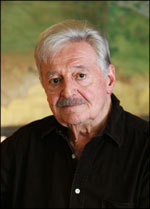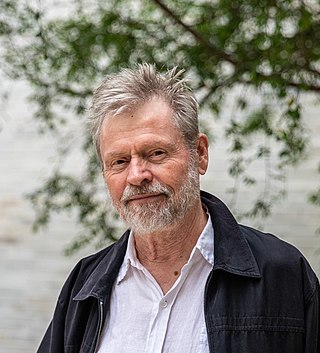Related Research Articles

Peter Joshua Sculthorpe was an Australian composer. Much of his music resulted from an interest in the music of countries neighbouring Australia as well as from the impulse to bring together aspects of Aboriginal Australian music with that of the heritage of the West. He was known primarily for his orchestral and chamber music, such as Kakadu (1988) and Earth Cry (1986), which evoke the sounds and feeling of the Australian bushland and outback. He also wrote 18 string quartets, using unusual timbral effects, works for piano, and two operas. He stated that he wanted his music to make people feel better and happier for having listened to it. He typically avoided the dense, atonal techniques of many of his contemporary composers. His work was often characterised by its distinctive use of percussion. As one of the compositional pioneers of a distinctively Australian sound, Sculthorpe and his music have been likened to the role played by Aaron Copland in America's musical coming of age.
Richard John Mills is an Australian conductor and composer. He was the artistic director of Victorian Opera from 2013-2023, and formerly artistic director of the West Australian Opera and artistic consultant with Orchestra Victoria. He was commissioned by the Victoria State Opera to write his opera Summer of the Seventeenth Doll (1996) and by Opera Australia to write the opera Batavia (2001).

Ross Edwards is an Australian composer of a wide variety of music including orchestral and chamber music, choral music, children's music, opera and film music. His distinctive sound world reflects his interest in deep ecology and his belief in the need to reconnect music with elemental forces, as well as restore its traditional association with ritual and dance. He also recognises the profound importance of music as an agent of healing. His music, universal in that it is concerned with age-old mysteries surrounding humanity, is at the same time connected to its roots in Australia, whose cultural diversity it celebrates, and from whose natural environment it draws inspiration, especially birdsong and the mysterious patterns and drones of insects. As a composer living and working on the Pacific Rim, he is aware of the exciting potential of this vast region.
Brett Dean is an Australian composer, violist and conductor.
Matthew John Hindson AM is an Australian composer.

Yitzhak Yedid is an Israeli-Australian composer of contemporary classical music. He is also a pianist and an educator.

Colin James Brumby was an Australian composer and conductor.
Ian Munro is an Australian pianist, composer, and music educator. His career has taken him to many countries in Europe, Asia, North America, and Australasia.
Philip Bračanin is an Australian composer and musicologist.
Daniel Rojas is a Chilean-born Australian pianist and composer. Rojas' work as a composer and improviser draws upon indigenous, folk, popular and classical Latin American traditions.
The Acacia Quartet is a string quartet based in Australia. It was founded in 2010 by violinists Lisa Stewart and Myee Clohessy, violist Stefan Duwe, and cellist Anna Martin-Scrase. Stewart plays A. E Smith violins. With the departure of Clohessy, Doreen Cummings joined the quartet as second violin.
String Quartet: An AIDS Activist's Memoir in Music, commonly abbreviated to AIDS Memoir Quartet, is a musical composition by composer Lyle Chan which premiered in 2014. The work has been exclusively performed by the Acacia Quartet.
Serenade for Tenor, Saxophone and Orchestra is a musical composition by Lyle Chan.
Mark Isaacs is an Australian classical and jazz composer and pianist.
Chris Hung is a Hong Kong composer and teacher.
Katy Abbott is an Australian composer. Abbott writes music for orchestra, chamber ensemble and voice. Her work reflects her interests in contemporary Australian cultures and often explores notions of home, place, humour and connection.

Stuart Greenbaum is an Australian composer and Professor of music composition at the University of Melbourne. He served as Head of Composition from 2007 to 2023 at the Melbourne Conservatorium of Music.
Claire Olivia Edwardes is an Australian classical percussionist, artistic director, composer and advocate for change in the classical music sector. Edwardes is the co-founder and artistic director of Ensemble Offspring, roles she shared with composer Damien Ricketson until his retirement from the group in 2015. In 2016, she won two APRA Art Music Awards, with one going to Ensemble Offspring for "sustained services to Australian music for 20 years", and Edwardes receiving an individual award "for performance, advocacy and artistic leadership”. She is the only Australian to have won the Luminary Art Music Award for an Individual 3 times. In 2019, Edwardes created and performed the music and dance theatre work RECITAL with dancer Richard Cilli and director Gideon Obarzanek for Dance Massive 2019. Edwardes composed the music and sound design for RECITAL in collaboration with Paul Mac. In 2011 and 2017, Edwardes was a member of the Australian World Orchestra. In 2015-216, Edwardes was the Vice President of the New Music Network. Edwardes has appeared on television as an occasional host of Play School, and as a panelist on Spicks and Specks. In 2021, Edwardes created The Australian Marimba Composition Kit and a comprehensive list of percussion works by female composers. Additionally, Edwardes has composed numerous works for solo waterphone. She is currently on staff as a percussion teacher at the Sydney Conservatorium of Music.
Vincent Plush is an Australian composer. He studied at the University of Adelaide under the composer Richard Meale and founded the Seymour Group in 1976. He has taught at the NSW State Conservatorium of Music and worked for the Australian Broadcasting Corporation. Plush was awarded a Harkness Fellowship and spent time at Yale University researching American composers. He writes about classical music for The Australian newspaper and has contributed to Limelight magazine. Baker’s Biographical Dictionary of Musicians describes Plush as a "remarkable Australian composer".

Paul Clift is an Australian composer of contemporary classical music. His catalogue of works to date comprises mostly instrumental music, often with electronics, video or other multimedia elements.
References
- ↑ "Lyle Chan". Australian Music Centre . Retrieved 12 March 2017.
- ↑ "Lyle Chan speaks to classikON about his musical influences". classikON. Retrieved 12 March 2017.
- ↑ John Cage Centenary Celebration (printed program for events 2 & 3 November 2012). Sydney Opera House. 2012.
- ↑ "Cage Centenary Program_FINAL" . Retrieved 12 March 2017– via Scribd.
- ↑ "100 years of John Cage – Classic Melbourne". Classic Melbourne. 5 September 2012. Retrieved 12 March 2017.
- ↑ "Live Review: John Cage Festival – Bang On A Can". Limelight . Retrieved 12 March 2017.
- ↑ "The Composers: John Cage Centenary Celebration". Megaphone Oz. Retrieved 16 March 2017.
- ↑ "Queer Arts Festival composers venture into the perpetual and the textual". Georgia Straight Vancouver's News & Entertainment Weekly. 22 June 2016. Retrieved 12 March 2017.
- ↑ "ABC Classic FM – Australian Music – String Quartet: An AIDS Activist's Memoir". ABC Classic FM. Retrieved 12 March 2017.
- ↑ Daley, Mick (19 August 2015). "Julian Burnside commissions classical ode to wind farms as rebuke to Tony Abbott". The Sydney Morning Herald. Retrieved 12 March 2017.
- 1 2 Burke, Kelly (2 April 2011). "I've got you, Abe … Carr channels his inner Lincoln". The Sydney Morning Herald. Retrieved 12 March 2017.
- 1 2 Westwood, Matthew (4 September 2014). "Composer Lyle Chan's musical reflections on an epidemic". The Australian.
- ↑ "Britten's letters with a teenage muse become a new song cycle". Limelight . Retrieved 12 March 2017.
- ↑ "Forever No. 1 : from 'Solo Piano' by Lyle Chan : Work : Australian Music Centre". australianmusiccentre.com.au. Retrieved 12 March 2017.
- ↑ Koehne, James (2004). Liner notes to Eternity: The Timeless Music of Australian Composers (sound recording) (PDF). Australian Broadcasting Corporation. p. 9.
- ↑ "Forever No. 1 and Forever No. 13 from Solo Piano". Lyle Chan. 31 August 2010. Retrieved 12 March 2017.
- ↑ "solo piano". Lyle Chan. Retrieved 12 March 2017.
- ↑ Lyle Chan (8 March 2012), Liberty & The Pursuit by Lyle Chan – All Souls Church, Leichhardt , retrieved 12 March 2017
- ↑ "Farwell My Good I. Forever : (excerpt from String Quartet) by Lyle Chan : Work : Australian Music Centre". australianmusiccentre.com.au. Retrieved 12 March 2017.
- ↑ "Untitled (2005, Thomas Brand gewidmet) : string quartet by Lyle Chan : Work : Australian Music Centre". australianmusiccentre.com.au. Retrieved 12 March 2017.
- ↑ Carnegie, Joel (25 July 2014). "AIDS activist's musical memoir a triumph". The Age. Retrieved 12 March 2017.
- ↑ ""Wachsein ist andersvo" from Voices and Instruments". Lyle Chan. 2 November 2010. Retrieved 12 March 2017.
- ↑ "Resonate 2011 :: Art Gallery NSW". artgallery.nsw.gov.au. Retrieved 12 March 2017.
- ↑ "Last Night's Rendezvous with Destiny". Thoughtlines with Bob Carr. 4 April 2011. Retrieved 12 March 2017.
- ↑ "Another Rendezvous with Destiny". Thoughtlines with Bob Carr. 20 September 2011. Retrieved 12 March 2017.
- ↑ Architecture of Sound (program book for concerts 24–25 August 2013) (PDF). Sydney Philharmonia Choirs.
- ↑ "Sydney Conservatorium of Music Chamber Choir". music.sydney.edu.au. Retrieved 12 March 2017.
- ↑ McCallum, Peter (2 November 2015). "The Song Company review: All Leunig Song Almanac brings cartoon whimsy to life". The Sydney Morning Herald. Retrieved 12 March 2017.
- ↑ Wilson, Janet (2 November 2015). "The All-Leunig Song Almanac: 12 composers on 12 months". The Canberra Times. Retrieved 12 March 2017.
- 1 2 "My Dear Benjamin | Queensland Symphony Orchestra". qso.com.au. Retrieved 12 March 2017.
- ↑ "My Dear Benjamin". Brisbane Festival 2015. Retrieved 12 March 2017.
- ↑ AMCOS, APRA. "2017 Art Music Awards". apraamcos.com.au. Retrieved 4 October 2017.
- ↑ "2017 Art Music Awards: winners : News (AMC) Article : Australian Music Centre". australianmusiccentre.com.au. Retrieved 4 October 2017.
- ↑ "Review: Blackwattle Trio (Bellingen Music Festival)". Limelight . Retrieved 12 March 2017.
- ↑ "String Quartet: An AIDS Activist's Memoir". vexations840.com. Retrieved 12 March 2017.
- ↑ "Lyle Chan". PANDORA, Australia's Web Archive– via Trove.